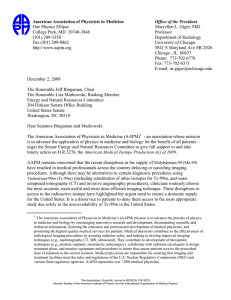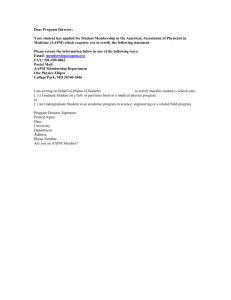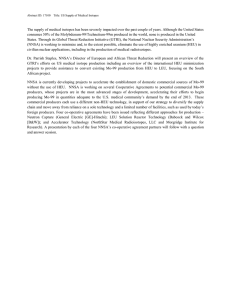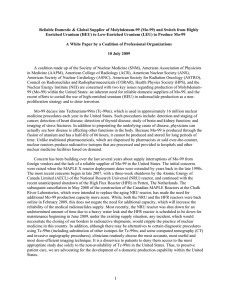July 15, 2009 The Honorable Edward Markey US House of Representatives
advertisement
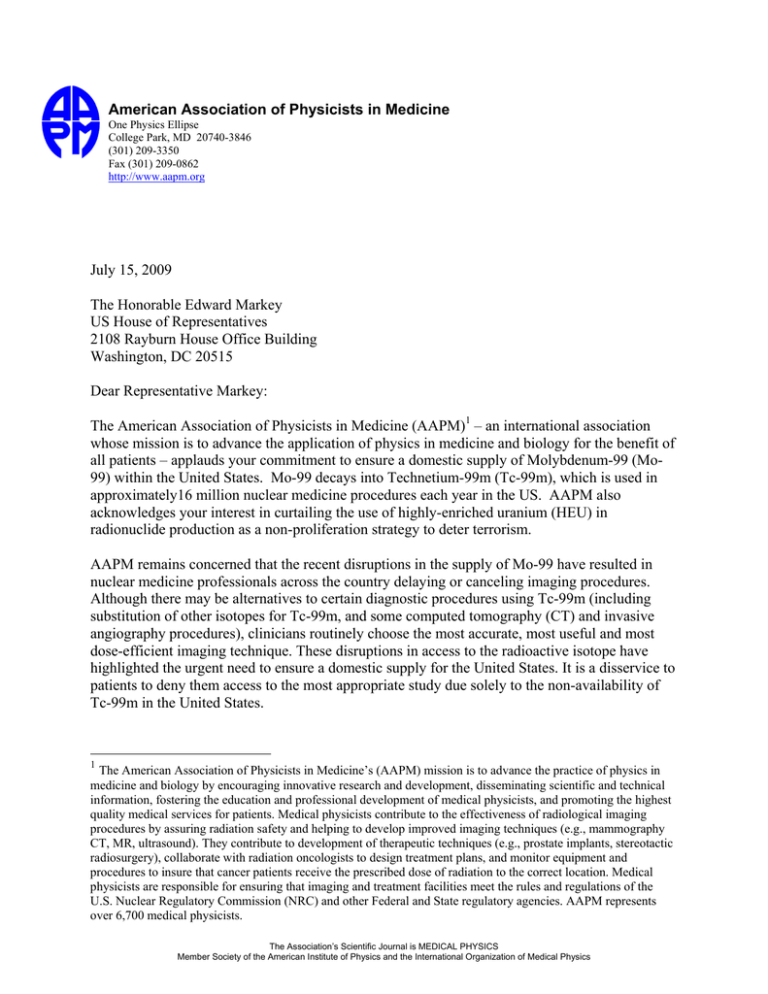
American Association of Physicists in Medicine One Physics Ellipse College Park, MD 20740-3846 (301) 209-3350 Fax (301) 209-0862 http://www.aapm.org July 15, 2009 The Honorable Edward Markey US House of Representatives 2108 Rayburn House Office Building Washington, DC 20515 Dear Representative Markey: The American Association of Physicists in Medicine (AAPM)1 – an international association whose mission is to advance the application of physics in medicine and biology for the benefit of all patients – applauds your commitment to ensure a domestic supply of Molybdenum-99 (Mo99) within the United States. Mo-99 decays into Technetium-99m (Tc-99m), which is used in approximately16 million nuclear medicine procedures each year in the US. AAPM also acknowledges your interest in curtailing the use of highly-enriched uranium (HEU) in radionuclide production as a non-proliferation strategy to deter terrorism. AAPM remains concerned that the recent disruptions in the supply of Mo-99 have resulted in nuclear medicine professionals across the country delaying or canceling imaging procedures. Although there may be alternatives to certain diagnostic procedures using Tc-99m (including substitution of other isotopes for Tc-99m, and some computed tomography (CT) and invasive angiography procedures), clinicians routinely choose the most accurate, most useful and most dose-efficient imaging technique. These disruptions in access to the radioactive isotope have highlighted the urgent need to ensure a domestic supply for the United States. It is a disservice to patients to deny them access to the most appropriate study due solely to the non-availability of Tc-99m in the United States. 1 The American Association of Physicists in Medicine’s (AAPM) mission is to advance the practice of physics in medicine and biology by encouraging innovative research and development, disseminating scientific and technical information, fostering the education and professional development of medical physicists, and promoting the highest quality medical services for patients. Medical physicists contribute to the effectiveness of radiological imaging procedures by assuring radiation safety and helping to develop improved imaging techniques (e.g., mammography CT, MR, ultrasound). They contribute to development of therapeutic techniques (e.g., prostate implants, stereotactic radiosurgery), collaborate with radiation oncologists to design treatment plans, and monitor equipment and procedures to insure that cancer patients receive the prescribed dose of radiation to the correct location. Medical physicists are responsible for ensuring that imaging and treatment facilities meet the rules and regulations of the U.S. Nuclear Regulatory Commission (NRC) and other Federal and State regulatory agencies. AAPM represents over 6,700 medical physicists. The Association’s Scientific Journal is MEDICAL PHYSICS Member Society of the American Institute of Physics and the International Organization of Medical Physics AAPM Page 2 of 2 Your bill, the American Medical Isotope Production Act of 2009, will help patients who rely on medical imaging for the treatment and diagnosis of many common cancers by authorizing funding and providing a clear road map to create a domestic supply of Mo-99 while also allowing a responsible timeline and safeguards for the transfer of HEU to low enriched uranium (LEU); therefore, AAPM endorses the American Medical Isotope Production Act of 2009. In order to ensure that patient needs are not compromised, a continuous reliable supply of medical radioisotopes is essential. Currently there are no facilities in the United States that are dedicated to manufacturing Mo-99 for Mo-99/Tc-99m generators. The United States must develop domestic capabilities to produce Mo-99, and not rely solely on foreign suppliers. In addition, forcing a change from HEU to LEU must be done within an adequate time period to allow for the research and development needed for the transition period. There also must be consideration of economic and environmental factors to, first and foremost, prevent putting patients at risk because of delays in production of much needed radionuclides, such as Technetium-99m (Tc-99m) which is made from Mo-99. AAPM believes your legislation will help address the needs of patients by promoting the production of Mo-99 in the United States. We thank you for your efforts and look forward to continuing to work with you on this important issue. Should you have any further questions, please contact Lynne Fairobent, Manager of Legislative and Regulatory Affairs, at lynne@aapm.org or 301-209-3364. Sincerely, Maryellen L. Giger, Ph.D., FAAPM, FAIMBE President
